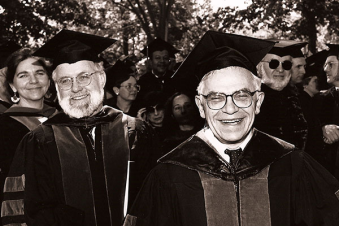Our School History

The Graduate School of Biomedical Sciences (GSBS) was established by the trustees of Tufts University on July 1, 1980 through the gifts of the late Dr. Arthur M. Sackler, Dr. Mortimer D. Sackler and Dr. Raymond R. Sackler. As a result of their generosity, six fledgling graduate programs at Tufts University School of Medicine were given a new home. This new school, the Sackler School of Graduate Biomedical Sciences, aligned with the vision of then president of Tufts University, Jean Mayer, who saw integration across all medical fields as crucial for health advancement. In December 2019, University President Anthony P. Monaco and Chair of the Board of Trustees Peter Dolan announced the decision to remove the Sackler name from all programs and facilities on the Tufts Boston health sciences campus–including the Graduate School of Biomedical Sciences–due to “the human toll of the opioid epidemic in which members of the Sackler Family and their company Purdue Pharma are associated.”
The original six graduate programs – Biochemistry, Immunology, Molecular Biology and Microbiology, Anatomy, Pharmacology and Experimental Therapeutics, and Physiology–and their faculty of 70 provided the foundation on which our school is built. These faculty and their students were a part of the Graduate School of Arts and Sciences prior to the founding of the Graduate School of Biomedical Sciences (GSBS).
GSBS was the first graduate biomedical sciences school in the US to embrace a clinical research PhD training program. In 1985, Dr. Louis Lasagna came to Tufts to lead the Graduate School of Biomedical Sciences. He served as the school's dean until 2001 and was largely responsible for growth that saw the faculty nearly triple and the student body grow from about 40 to nearly 250. Dr. Lasagna's pioneering vision established a school in which basic, translational, and clinical research are strongly valued. This spirit enriched the GSBS, which has welcomed basic scientists, physician scientists and clinical investigators to its faculty. Under his guidance, the School formed two divisions in 1999, the Basic Science Division, home to faculty and programs focused on the basic research disciplines that underpin biomedical research, and the Clinical Research Division, home to a graduate program focused on physician trainees and others with advanced health-related degrees who are interested in this discipline. Dean Lasagna was followed by David Stollar (ad interim), Naomi Rosenberg, Daniel Jay and most recently, Michael Chin.
Since its inception, the GSBS faculty has grown. The school was quick to include the strong research faculty at Tufts Medical Center and now has members from across the schools of Tufts University. Members are also located at The Jackson Laboratory in Bar Harbor, Maine and MaineHealth in Scarborough, Maine.
The number of GSBS graduate programs has changed over the years. Neuroscience was added in 1985 and Genetics was founded in 1994. Clinical & Translational Science was added in 1999 and an MS in Pharmacology & Drug Development was added in 2013. AN MS in Biomedical Research was added in 2023.
Some programs changed to embrace advances in biomedical sciences. The Physiology Program spawned the Molecular and Cellular Physiology Program, a shift that strengthened program focus on the pathobiology of disease. Consistent with its strong focus on molecular pathogenesis mechanisms, the Molecular Biology and Microbiology Program became the Molecular Microbiology Program. The Anatomy Program increased its relationship to developmental biology and translational medicine, and became the Cell, Molecular and Developmental Biology Program. More recently, the Pharmacology & Experimental Therapeutics PhD program was discontinued, and the Cellular & Molecular Physiology and Biochemistry Programs merged with the Cell, Molecular & Developmental Biology Program. In September of 2023, the Genetics and Cell, Molecular & Developmental Biology programs merged to form a new program, the Genetics, Molecular & Cellular Biology Program. In 2024, the school added the Masters in Biomedical Research program.
Although the Graduate School of Biomedical Sciences graduated its first class less than 40 years ago, GSBS has established itself as a leading institution for biomedical graduate education, with over 1,000 alumni that contribute across the biomedical workforce. The high educational standards and the excellent training and research programs that are part of the school play a key role in the life of the Health Science Campus and Tufts University as a whole.